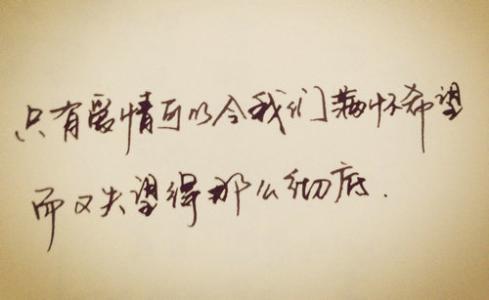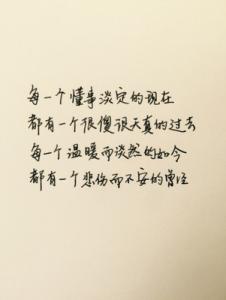心情有很多种,比方说:有伤心的;高兴的;忧伤的;兴奋的;开朗的;愁眉苦脸的;悲痛欲绝的;惹人怜爱的等……多的说不完。下面是小编带来的表达伤心英语句子,欢迎阅读!
表达伤心英语句子1●失望
◎真让人失望! What a disappointment!
I didn't get a raise. What a disappointment! (没有给我提薪,真让人失望!)
That's too bad. (太遗憾了。)
= What a let down!
= I'm disappointed with it.
= This is disappointing.(这真令人扫兴。)
◎太遗憾了! What a pity!
I couldn't go. (我没去成。)
What a pity. (太遗憾了。)
= What a shame!
= What a shame! (多倒霉!)
= Isn't it though? (就是呀!)
= What a bummer!
= Bummer! *口语中用来表示事情的进展不像自己所想象的那样。
= Too bad! (太糟糕了。)
= I failed the exam. (我考砸了。)
= Too bad. (太糟糕了。)
= That's too bad!
◎白费力了。 It was a waste of effort.
*waste “浪费”、“白搭”,effort表示“努力”、“费尽力气”。
= It was a waste of my effort.
= My effort was wasted.
= All my effort went down the drain.
◎白费劲。 a wild-goose chase
*wild goose表示“过路的大雁”,chase意为“追赶”。会话中常用。
Did you find him. (你找到他了吗?)
No, he led me on a wild-goose chase. (没有,白费了半天劲。)
◎前功尽弃。 All that for nothing.
*事情进展得不那么顺利时,表示“我费了那么大的劲儿,我作出了那么多的努力,可是……”。
= It was all a waste.
= It was all for nothing.
◎你真让我失望。 You let me down.

I'm sorry I didn't come to your wedding. (对不起,我没能参加你的婚礼。)
Yeah, you let me down. (是啊,我很失望。)
= You disappointed me.
◎我真失策。 I blew it.
*常用俚语,表示“失败”、“失策”、“干了一件蠢事”。
I blew it. I lost the customer. (我真失策,失去了那个客户。)
Make sure it doesn't happen again. (再也不要发生这样的事了。)
= I screwed up.
= I messed up. (我给搞砸了。)
= It's all my fault. (全都是我的错。)
◎毫无办法。 It can't be helped.
There's nothing you can do about it. (这事一点儿办法都没有。)
◎纯属浪费时间。 It's a waste of time.
How was it? (怎么样?)
It was a waste of time talking to him. (跟他谈话,纯属浪费时间。)
◎差不多了! Almost!
*用来表示几乎就要成功了。
Almost! (差不多了!)
Nice try. (干得不错。)
◎我感到悲伤。 I feel sad.
What's wrong? (怎么了?)
I feel sad. (我感到悲伤。)
= I'm sad.
= I'm unhappy.
◎我感到非常痛苦。 I feel really sad.
= I'm really sad.
= I'm really unhappy.
◎哦!天哪! Oh, dear!
My dog died. (我的狗死了。)
Oh, dear! (哦!天哪!)
= Oh, my!
= Alas! *旧的说法。
◎呜呜! Boohoo. *用在大声哭泣时,呜呜地哭。
◎我的心都碎了。 My heart broke.
= I felt heart broken.
◎我的内心充满了悲伤。 My heart has been filled with grief.
*be filled with... 表示“充满……”,grief 表示“极度悲伤”、“悲叹”。
◎那悲惨的故事使我心情抑郁。 The sad story depressed me.
*depress 表示“使消沉,使沮丧”。
The sad story really brought me down.
*bring...down “使……灰心丧气”。
◎真无情! How ruthless!
She stole my customer. (她抢走了我的客人。)
How ruthless! (真残忍!)
= How uncaring!
= How cruel!
◎没人能知道我的感受。 No one can understand how I really feel.
Please talk to me. (请跟我说说吧。)
No one can understand how I really feel. (没人能明白我的真实感受。)
= No one can relate to me.
= Nobody understands my feelings.
表达伤心英语句子2我感到很寂寞。 I feel lonely.
I feel lonely without my husband. (丈夫不在,我感到很寂寞。)
He'll be back next week. (他下个星期就会回来。)
= I'm lonely.
= I feel all alone.
◎我讨厌孤独。 I hate being alone.
◎我不在乎孤独。 I don't mind being alone.
◎我想念你。 I miss you.
*miss 表示“因某人不在而觉得寂寞”,I miss you含有I want to see you(我想见到你)和I want to be with you(我想和你在一起)这两种心情。
I miss you. (我想念你。)
I miss you, too. I'll be home soon. (我也想你,我马上就会回去的。)
= I feel lonely without you.
= I feel helpless without you. (没有你,我感到无助。)
◎我觉得空荡荡的。 I feel empty.
*empty表示“缺少内容的,缺乏价值的,没有意义的”。
My son died, now I feel empty. (我儿子去世了,我心里空荡荡的。)
I'm sorry to hear that. (真是太不幸了。)
I feel incomplete.
*incomplete(不完全的)在这里表示“内心不充实”的状态,比I feel empty.更强调空虚。
◎我的生活很空虚。 My life is empty.
My life is meaningless. (我的人生毫无意义。)
I'm all alone in this world. (在这个世界上我总是孤独的。)
I don't feel satisfied with my life. (我对我的生活并不满意。)
◎最终只剩下了我一个人。 Alone at last.
= I'm finally alone.
表达伤心英语句子3郁闷、忧郁
◎我很沮丧。 I'm depressed.
I'm depressed. I lost my job. (我很沮丧,因为我失去了工作。)
Cheer up! You'll get a new job. (打起精神来!你一定能找到新工作。)
= I feel blue.
= I feel low.
= I feel really down.
◎我今天感到很忧郁。 I've got the blues today.
*blue表示“忧郁的”,blues表示“郁闷,忧郁症”。
= I feel down in the dumps today.
◎这真让人沮丧。 It's depressing.
No one understands me. It's depressing. (没人能理解我,真让人泄气。)
Don't talk like that! I understand you. (别那样说,我理解你。)
It's sad. (真可悲。)
It makes me feel depressed. (这使我感到闷闷不乐。)
◎雨天使我感到消沉。 Rainy days get me down.
= Rainy days make me sad.
= I feel blue on rainy days.
◎我提不起精神来做事。 I don't feel like doing anything.
I don't feel like doing anything today. (我今天什么都不想干。)
Come on! Let's get moving. (好了好了,咱们赶快点儿吧。)
I don't have any enthusiasm for life. (这辈子没什么能让我提起兴趣来。)
◎他满脸忧愁。 He looks melancholy.
= He has a melancholy look.
◎今天,他看上去很郁闷。 He looks gloomy today.
*gloomy 常用来形容“(天气等的)阴沉沉的”,在此表示“烦闷、忧郁的感觉”
 爱华网
爱华网



